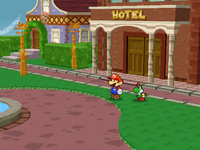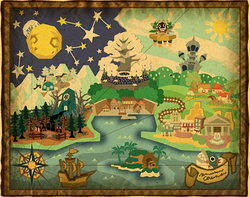Poshley Heights
| Poshley Heights | |
|---|---|
 Mario and Mini-Yoshi standing in front of the hotel's entrance | |
| First appearance | Paper Mario: The Thousand-Year Door (2004) |
| Latest appearance | Paper Mario: The Thousand-Year Door (Nintendo Switch) (2024) |
| Greater location | Rogueport's surrounding areas |
| Inhabitants | Bumpties, Toads, Bob-ombs |
- “Hey, there. Poshley Heights is sure nice and warm, eh? Yah, I really dig it here. Cold places make me sneeze...”
- —Penguin, Paper Mario: The Thousand-Year Door
Poshley Heights is a posh village that Mario visits to acquire the Garnet Star in Paper Mario: The Thousand-Year Door. The Excess Express stops at the Poshley Heights Station, the main form of transportation into the village, though a pipe later opens through which Mario can access the village. It is the home of many affluent individuals, including Goldbob, Sylvia, and Bub, as well as several Penguins and Toads. Toodles owns a summer home here, and Lady Bow and Bootler also vacation here after Mario and company defeat the Shadow Queen. Sir Grodus, Lord Crump and the X-Nauts are also shown to have ended up in Poshley Heights after the Shadow Queen's defeat; however, when Mario goes to the place where they can be seen in Goombella's e-mail, they can't be found there. The town's main attraction is the Poshley Sanctum, home of the Garnet Star, where Pennington serves as manager when he's not performing detective work.
Along with Rogueport, Poshley Heights has the only inn, Royal Poshley Park Tower, in Paper Mario: The Thousand-Year Door that has more than one room, though it is the most expensive at 30 coins per stay as opposed to the average 5-10 coins. Royal Poshley Park Tower's suite, the only room in which Mario and his party can stay, is similar to the Marrymore suite from Super Mario RPG: Legend of the Seven Stars. The morning after Mario rests at the Royal Poshley Park Tower, the staff serves him an Omelette Meal prepared by Zess T.
Inhabitants
Main Story
- Pennington
- Goldbob
- Sylvia
- Bub
- Toodles
- Toadia, secretary of the Luigi Fan Club
- Penguin residents
- A male Toad Poshley Heights Station Worker in black and blue uniform that checks train tickets.
- A green female Toad who sells Fresh Pasta in her stand
- An orange female Toad receptionist of the Royal Poshley Park Tower, who Dupree has a crush on
Only During Chapter 6
Post-Game
- Lady Bow and Bootler
- Sir Grodus, Lord Crump and the X-Nauts
Items
| Item | Icon | Location |
|---|---|---|
| Choco Cake | Given by Toadia after finishing her trouble. | |
| Fresh Pasta | In the second area, it can be bought for 50 coins from the shop in the left. | |
| Goldbob's Pass | Given by Goldbob during the General White hunt in Chapter 7. | |
| HP Drain P | In the first area, it's in a chest in the back room of Goldbob's house. Accessible using Paper Mode. | |
| Inn Coupon | In the second area, it's behind the pasta-selling little shop in the left. | |
| Omelette Meal | In the second area, it appears in the desk to the left of the inn counter after sleeping at the inn. | |
| Package | Given by Goldbob during his trouble. | |
| Platinum Card | Given by Toodles after finishing her trouble. | |
| Present | Given by Bub while doing his trouble. | |
| Shine Sprite | In the third scene, it's high to the right of Poshley Sanctum. | |
| Star Piece | In the first scene, it's under a panel in the red floor at the center. | |
| In the first scene, it's behind the chair to the left of Goldbob's house. | ||
| In the first scene, it's inside the hedge to the right of Toodles's house. | ||
| In the second scene, it's in the corner of the hedge to the northwest of the penguin's house. |
Area Tattles
- "This is the Poshley Heights Station. The Excess Express to Rogueport is here. This place is sooooo upscale. It's like, the polar opposite of Rogueport. You can tell that movie stars and millionaires live here. It just REEKS of cash."
- "This is Poshley Heights. It's a relaxed town that positively reeks of money. There's a very nice hotel here, too. Wouldn't it be nice to stay there sometime?"
- "That's Poshley Sanctum. I guess the sanctum grounds are used as a public square. That fountain out front is unique, huh? Yeah, but that water... I bet Nibbles would still chomp your tush if you fell in..."
In-game map description
- GameCube Version: A town famous for all of the rich and famous people living in it. There are plenty of extravagant vacation homes and hotels in town.
- Switch Version: A town famous for all of the wealthy people living in it. There are plenty of extravagant vacation homes and hotels in town.
Names in other languages
| Language | Name | Meaning | Notes |
|---|---|---|---|
| Dutch | Praalstede[?] | From praal (meaning splendor) + stede (old word for town) | |
| French | Picaly Hills[?] | From the Japanese name | |
| German | Bad Glimmerich[?] | From bad- (meaning "bath", a prefix in German place names indicating a spa town) + glimmer ("to gleam") and possibly -ich (a German suffix for place names) | |
| Italian | Sfoggy Hills[?] | Diminutive of sfoggiare ("to flaunt) + "hills" | |
| Spanish | Villa Preciosa[?] | Valuable Village |
Trivia
- In the house adjacent to the hotel, the penguin at the far end of the room references Shiver City from Paper Mario, while tattling the penguin near the front door reveals that he bought the house because of the sales of Herringway's novels, as the penguin is a relative of Herringway.

